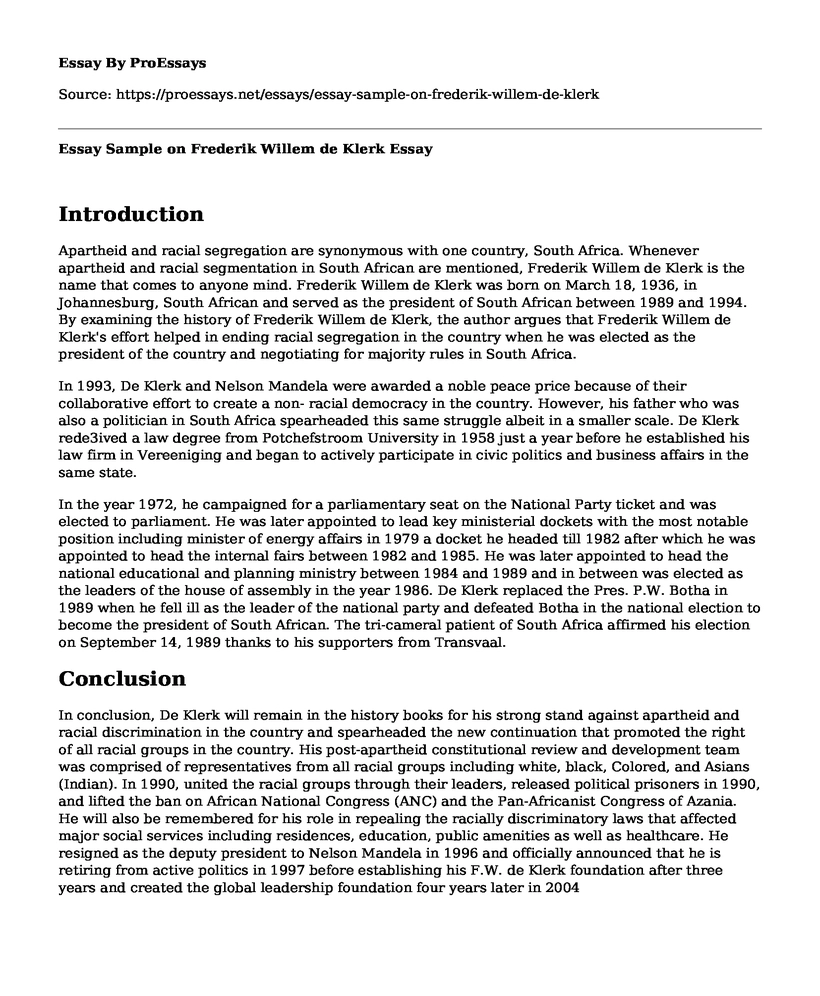Introduction
Apartheid and racial segregation are synonymous with one country, South Africa. Whenever apartheid and racial segmentation in South African are mentioned, Frederik Willem de Klerk is the name that comes to anyone mind. Frederik Willem de Klerk was born on March 18, 1936, in Johannesburg, South African and served as the president of South African between 1989 and 1994. By examining the history of Frederik Willem de Klerk, the author argues that Frederik Willem de Klerk's effort helped in ending racial segregation in the country when he was elected as the president of the country and negotiating for majority rules in South Africa.
In 1993, De Klerk and Nelson Mandela were awarded a noble peace price because of their collaborative effort to create a non- racial democracy in the country. However, his father who was also a politician in South Africa spearheaded this same struggle albeit in a smaller scale. De Klerk rede3ived a law degree from Potchefstroom University in 1958 just a year before he established his law firm in Vereeniging and began to actively participate in civic politics and business affairs in the same state.
In the year 1972, he campaigned for a parliamentary seat on the National Party ticket and was elected to parliament. He was later appointed to lead key ministerial dockets with the most notable position including minister of energy affairs in 1979 a docket he headed till 1982 after which he was appointed to head the internal fairs between 1982 and 1985. He was later appointed to head the national educational and planning ministry between 1984 and 1989 and in between was elected as the leaders of the house of assembly in the year 1986. De Klerk replaced the Pres. P.W. Botha in 1989 when he fell ill as the leader of the national party and defeated Botha in the national election to become the president of South African. The tri-cameral patient of South Africa affirmed his election on September 14, 1989 thanks to his supporters from Transvaal.
Conclusion
In conclusion, De Klerk will remain in the history books for his strong stand against apartheid and racial discrimination in the country and spearheaded the new continuation that promoted the right of all racial groups in the country. His post-apartheid constitutional review and development team was comprised of representatives from all racial groups including white, black, Colored, and Asians (Indian). In 1990, united the racial groups through their leaders, released political prisoners in 1990, and lifted the ban on African National Congress (ANC) and the Pan-Africanist Congress of Azania. He will also be remembered for his role in repealing the racially discriminatory laws that affected major social services including residences, education, public amenities as well as healthcare. He resigned as the deputy president to Nelson Mandela in 1996 and officially announced that he is retiring from active politics in 1997 before establishing his F.W. de Klerk foundation after three years and created the global leadership foundation four years later in 2004
Cite this page
Essay Sample on Frederik Willem de Klerk. (2022, Nov 17). Retrieved from https://proessays.net/essays/essay-sample-on-frederik-willem-de-klerk
If you are the original author of this essay and no longer wish to have it published on the ProEssays website, please click below to request its removal:
- Shaw Shank Redemption Ethical Dilemmas - Film Analysis Essay
- Paper Example on Principled Negotiation
- Essay Example on Interpersonal Relationships in the Film Love Jones
- Essay Sample on Importance of Mitigating Terrorist Attacks
- Essay on Cross-Cultural Communication in Romantic Relationships: A Study of Early Stages
- Parenting Capacity Assessment: Evaluating Parents' Responsibilities for Child Upbringing - Essay Sample
- Essay Example on Korea: Successfully Reducing Poverty and Inequalities







